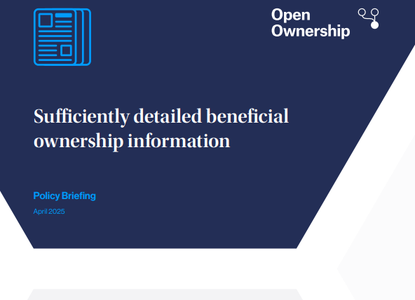Designing sanctions and their enforcement for beneficial ownership disclosure
Help us understand how you are making use of resources from the Open Ownership website by filling out this short survey
Publication type
Briefing
Publication
Sections
Implementation,
Research
Open Ownership Principles
Up-to-date and historical records,
Sanctions and enforcement
Summary
This policy briefing highlights key considerations for policy makers and implementers for establishing a sanctions and enforcement regime that is effective, proportionate and dissuasive. It helps think through various legal, policy and technical aspects of sanctions and their enforcement, to ensure compliance for adequate, accurate, and up-to-date beneficial ownership information. The briefing identifies emerging good practice from different countries and outlines key policy principles.
Key points
- Sanctions regimes should have a combination of administrative, financial, non-financial, and criminal sanctions against both natural persons and corporate entities.
- To avoid creating liability loopholes, sanctions should cover all the key persons of the company – the declaring person, the beneficial owner(s), and the officers of the company – as well as the company itself.
- Sanctions should be in place for all forms of noncompliance, including non-submission of information, late-submission, incomplete submission, and false submission, as well as persistent noncompliance.
- To effectively operationalise sanctions and their enforcement, it should be clearly determined which authority is responsible for enforcing sanctions.
- If implementers collect, monitor, and publish statistics on issued sanctions and prosecutions and their outcomes, as well as compliance rates, it will be possible to measure the effectiveness of sanctions.



